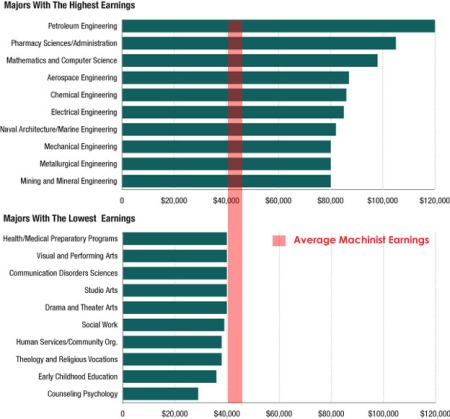I’ve discussed this in previous posts how there are other options besides a 4-year college degree and the debt that comes with it when choosing a career path. Today, discussing salary comparisons, we have a guest post from Miles Free, Director of Technology and Industry Research for PMPA (Precision Machined Products Association).
Many people think that the choice of where they went to school is an important factor in their post graduation earnings.
A report from Georgetown University shows that the choice of major has a much greater influence on those earnings.
We thought that we would show how the average wage of a skilled machinist compares to those earnings – without the 4+ years of college and the debt most graduates build up while at school.
Our figures for the skilled machinist were taken from our latest Shop Hourly Employee Wage Report and represent the annual straight time hourly earnings for a setup qualified multiple spindle, rotary transfer, Swiss type, or multi axis CNC turning/machining center operator.
The machinist earnings are a low estimate, frankly, because many machinists are scheduled overtime.
The college major earnings data was posted by Planet Money on the NPR site. It was originally prepared by the authors of the Georgetown study.
Average earnings of setup qualified precision machinists exceed those of lowest earning college majors – without the college loans to repay.
We were well served by our college degree, eventually. The problem was, when we graduated, we were making more in manufacturing than our degree would earn us in an entry level position in our field.
If you have the passion for academics and a 4+ year university program, that’s great.
But if you know that you really aren’t “scholarship” material, and you’d rather be doing exciting work than writing papers and piling up student debt, we think it will be worth your time to investigate a career in precision machining – or any other craft like electrician, mechatronics, welding, tool and die making, robotics…
Successful completion of high school math algebra, geometry, trig is all that is needed to be able to do the math for precision machining.
We’d love to help you start your well paying career.
More information:
P.S. I interviewed a member CEO today: Their machinists averaged $50,000 last year, plus top-of-the-line medical, vacation, holidays, personal days, uniforms, plus company paid training and more…You should really give serious thought to gaining a skill rather than a degree.
